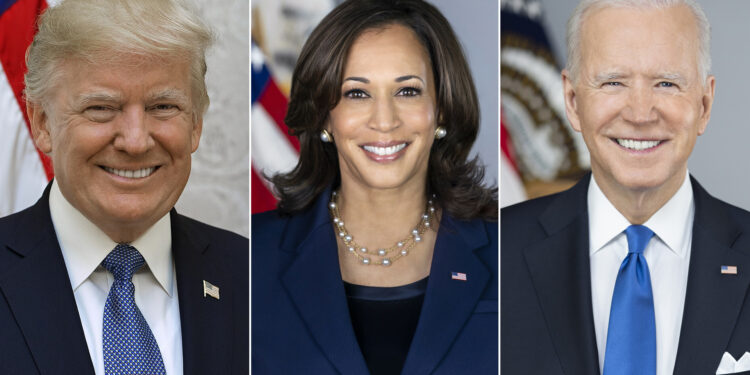Democratic presidential candidate Kamala Harris’ campaign announced Sunday that it has raised a total of half a billion dollars in donations, which a spokeswoman described as a “record amount.”
But the amount actually indicates the great damage that political money is doing to American democracy, especially since the Supreme Court’s decisions in 2010 that lifted many restrictions on campaign financing, according to an analysis by writer Françoise Bogon reported on the French website Mediapart.
According to Bogon, corporate money and the oligarchy (a small group of wealthy and influential people) are threatening to destroy the safety valves of democracy, as the wealthy and corporations are hitting small donors at their core, leading some to talk about plutocracy, a government controlled by the wealthy, which was established by Supreme Court decisions in 2010 in the name of freedom of expression.
According to Mediapart, the decisions – particularly those issued in the famous case “Citizens United v. Federal Electoral Commission” – opened the door wide to unlimited political funding, especially in presidential elections, so that companies, unions, associations and organizations can donate without limits, provided that there is no relationship of subordination.
Rich man game
“Individual control of the campaign finance system skews election results in favour of the rich or those with concentrated wealth, such as corporations,” Ciara Torres-Spellis, a political finance expert, was quoted as saying by Mediapart.
In her 2018 book, The Price of Democracy, Frenchwoman Julia Kagi describes the dominance of money in American democracy, saying, “All the fortresses have been demolished, and there is nothing left to prevent the flow of donations from wherever they came from, and even transparency has been eliminated… The Democratic and Republican parties are under the sway of money, and politicians from the right and left only sing what pleases the ears of the well-off.”
Mediapart listed some of the massive donations that have been poured into the current campaign, including, for example, $100 million given by the wealthy Timothy Mellon to the Republican candidate Donald Trump and to a close independent competitor.
Mellon comes from one of America’s richest families and is the grandson of a minister who was prosecuted in 1930 for tax evasion after amassing a fortune in the railroad and banking sectors.
The Democratic camp is backed by wealthy donors such as Reid Hoffman, co-founder of LinkedIn, and Michael Bloomberg, the former mayor of New York.
Mediapart quotes Open Secrets, a website that audits political financing operations based on data from the Federal Election Commission, as reporting record numbers that were set even four years ago.
The numbers show that the 2020 presidential election campaign spent $5.7 billion, bringing the total spent that year to $14.4 billion (if the $8.7 billion spent in the congressional elections is added to it), meaning that everything spent in the presidential elections and the midterm congressional renewal in 2022 was double what was spent in 2016 and 2018.
But this is a new record that will likely be set this year.
suspicious money
Mediapart explains how funds are raised in presidential election campaigns through the official committees of the candidate’s campaign on the one hand, and on the other hand through political action committees whose role has increased since the rulings issued in 2010, and which are now able to collect donations from companies, unions, associations and individuals, and their spending is unlimited, and they can even launch a campaign in favor of or against a specific candidate.
Although political action committees are supposed to disclose their donors, reaching them is virtually impossible in practice, and it is very difficult to know who is really behind a particular company or organization, hence the talk of “dirty money.”
Ciara Torres-Spellis defines dirty money as “money spent in US elections without being disclosed to the public so that they cannot know exactly where it came from.”
According to Spellis, author of “Corporate Dictatorship: How to Protect Democracy from Dirty Money and Corrupt Politicians,” the problem of this type of funding is old, “but it has been exacerbated by the Supreme Court’s decision in 2010,” making it difficult to know who the donor is, and anyone can hide behind a nonprofit, for example, not to mention the possibility of foreign interference.
“When a political message reaches a voter without them knowing who is trying to manipulate their vote, it’s very difficult to assess the credibility of the message,” she explains. “If you know it’s coming from Chevron[the US energy giant]you interpret it differently than if it’s coming from Greenpeace. But what if Chevron can hide behind a name that’s a cover for manipulation, as companies often do, then people are confused.”
The latest figures (based on Open Secrets and Reuters) show that the total donations received by the Democratic camp in the current presidential election campaign amounted to one billion dollars, compared to about 472 million for Trump.
Time of consensus
According to Mediapart, the time when both parties (Democrats and Republicans) agreed on the need to ensure transparency in political financing is over. After the resignation of President Richard Nixon (who received donations from wealthy people and corporations in his campaign against the Democratic Party), Congress adopted decisive reforms to strengthen public financing, reduce candidate spending, and curb private interests. Then came another law passed by both parties in 2002, sponsored by Republican John McCain and Democrat Russ Feingold, one of the most prominent provisions of which was to set a ceiling on campaign financing.
“The consensus was shattered in 2010 by the Supreme Court,” adds Spilisi, who believes Republicans are more eager to reject a funding cap.



